
via
This blog is still and maybee always will be in alpha. There is no strict editorial direction at this time, but it's likely to be rantings and ravings about technology, design, art, culture and especially all things new media.

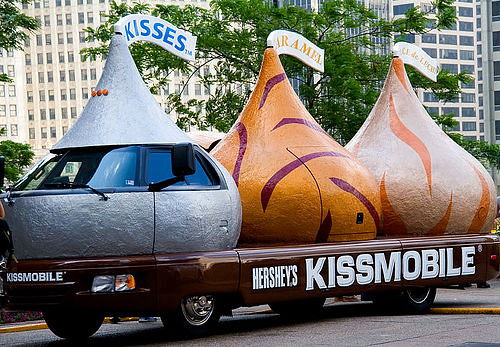
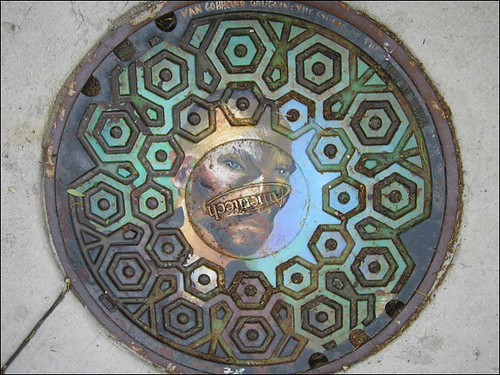
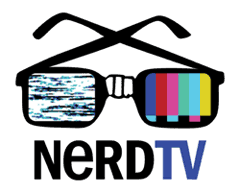 I can't tell you how excited I am about Cringely's Nerd TV comming soon to bittorrent near you. I just hope the mac version of FireANT will have Bittorrent integration by Sept 6th. It's the beautiful progression of "getting it", and public broadcasters like like PBS, NPR, CBC, and BBC are a very important step in that process. it was partly the proliferation of podcasting shows like NPR's On the Media and the tremendous amount of BBC material that really bolstered podcasting through the middle ground to make it the success it is today. 2005 will really be looked back on as the year democratized media exploded. And exploded it has. Audio podcasting is now an undeniable force in media, and video blogging is hot on its heals with the announcement last week from PBS about Nerd TV.
I can't tell you how excited I am about Cringely's Nerd TV comming soon to bittorrent near you. I just hope the mac version of FireANT will have Bittorrent integration by Sept 6th. It's the beautiful progression of "getting it", and public broadcasters like like PBS, NPR, CBC, and BBC are a very important step in that process. it was partly the proliferation of podcasting shows like NPR's On the Media and the tremendous amount of BBC material that really bolstered podcasting through the middle ground to make it the success it is today. 2005 will really be looked back on as the year democratized media exploded. And exploded it has. Audio podcasting is now an undeniable force in media, and video blogging is hot on its heals with the announcement last week from PBS about Nerd TV.What's changed since 2002 is a dramatic expansion of broadband Internet access and a dramatic lowering of both bandwidth and distribution costs. I make a distinction between bandwidth and distribution expenses because there are technologies like Bit Torrent that can take much of the expense out of video distribution by removing some of the bandwidth demand. I say SOME of the bandwidth demand because Bit Torrent is a fickle lover and if I throw a couple hundred episodes of NerdTV up there, only the most recent are likely to be broadly seeded, meaning the archive distribution costs fall back on me.
Yes, me.
Even with 355 megabits-per-second of Internet bandwidth, PBS can't take a risk of derailing the NewsHour or crippling PBSKids if NerdTV happens to be a surprise hit, so the real heavy lifting for NerdTV will be done through a network of distributed servers I've created as a kind of "poor man's Akamai." My distribution cost using this system, by the way, works out to be approximately ONE PERCENT of Akamai's retail price, which shows how much profit there is in that business, or should be.
"[A] new fact has now become painfully clear to me: you don't say you have the Ph.D unless you REALLY have the Ph.D." ... Cringley upon being exposed for having falsely claimed a Ph.D. from Stanford University.
"If the automobile had followed the same development cycle as the computer, a Rolls-Royce would today cost $100, get a million miles per gallon, and explode once a year, killing everyone inside."
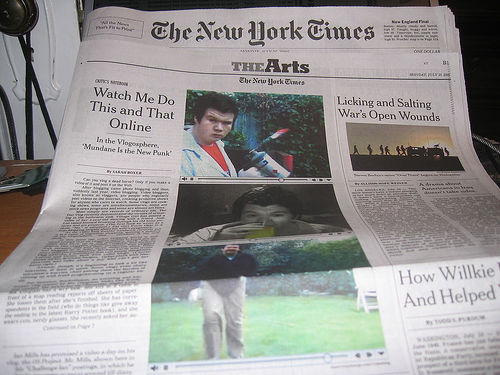
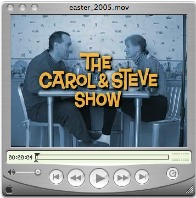
"Another vlog, the Carol and Steve Show, in which a married couple offer up the tedium of their daily lives - shopping, driving to the gym, arguing about American Idol' - has stolen its type and its theme music from the land of sitcoms."

"You look like a terrorist!On a final side note, how often do you get to call people you hardly know terrorists? You just can't pass up opportunities for that type of irreverent humor.
LOL.
Just joking, you're a fine looking man, you just need to smile more for craps sake!
BTW, I don't think I've commented before on your flickr feed. So I wanted to say a few words.
IT ROCKS! I can't keep up on make, to much going on, but through your flickr feed I can CAN keep up on make. I can flip through your photos and get the skinny on a story in about 1/1000th of the time it would take to keep up on all of Make, and that let's me find and spend more time reading the make stories I really like as opposed to skimming them all.
In short the use of flickr as an alternative blog feed interface is bloody brilliant! I've been posting all my blog images on flickr since the beginning of time, but I've failed to link them through to the actual articles so while it makes a great 'life picture' it's useless for following my day-to-day blog.
Sorry, I aspire to but cannot compete with your brilliance. :)
Oh, soo, a tip for a make article, you should focus in on using a specialized news reader, or desktop widget with your flickr 'friends feeds' to keep up with your friends photos in real time. Also very useful for events, I wish I had thought of it during the longon bombings, to watch tat unfold in realtime would have been overwhelming.
I got the idea from a chris pirillo interview with the napsterization gal, I forgot her name, oh, and she's sort of also the person behind this here thing, flickr, I think. :) Anyway, I immediately went and downloaded NetNewsWire and removed all its default feeds and popped in just my flickr friends feed and set it to 30 minute updates.
Yesterday was amazing watching you, eric rice, scobelizer, chris and the rest of the gang all post your raineer photos in damn near realtime from the flight. I got an amazing near real-time impression of the whole event, and was able to follow up through all yoru blogs, podcasts, and especially eric's video blog. Needless to say I'm bloody hooked. An whomever came up with that idea to invite you all on that flight... hot damn... I've never seen better media coverage of a single even in my life. Screw the superbowl!
Thanks a million!
-Mike of mmeiser.com/blog"
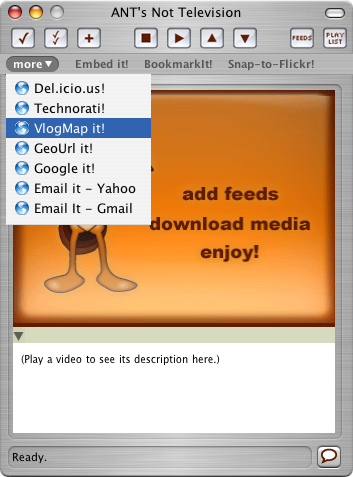
 From Bernie Ebbers, a 19th century-style tech tycoon? Salon Technology Log, Oct. 6, 1999
From Bernie Ebbers, a 19th century-style tech tycoon? Salon Technology Log, Oct. 6, 1999
"The rise of Bernie Ebbers bears comparison with the rise of the industrial tycoons of the 19th century. If it seems incredible that after just 16 years in the business Ebbers should be engineering the biggest corporate takeover in history, consider this: Andrew Carnegie first invested in steel in 1861. Forty years later, after buying out a string of competitors, he sold his steel holdings to J.P. Morgan. They formed the core of the new U.S. Steel, and Carnegie, the onetime 'bobbin boy' (yes, all the histories still call him that, even now when no one knows what that means) from a textile mill was reputedly the richest man in America.
There is, however, one great difference between the Carnegies and Rockefellers of the 19th century and the mega-tycoons of today. Carnegie, effectively, was accountable to no one but himself (and a conscience that was for Carnegie always a source of some trouble); Ebbers is the servant of his shareholders. This is certain: He will stay on top of the world only as long as his share price keeps rising. We live in a far more rational, and arguably more honest, economic world. Whether that turns out to be a fairer one, less prone to the excesses of monopoly and more hospitable to those at the bottom of the economic ladder, is still an open question."
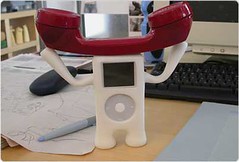 Ha! I just spotted this over in Steve Garfield's coverage of the MacWorld Boston conference last week and even though I'm a week behind I couldn't not post it. This little product, the iGuy from Speck Products, fits squarely in the "emotional design" category as a prime example of products that illicit an emotional attachment.
Ha! I just spotted this over in Steve Garfield's coverage of the MacWorld Boston conference last week and even though I'm a week behind I couldn't not post it. This little product, the iGuy from Speck Products, fits squarely in the "emotional design" category as a prime example of products that illicit an emotional attachment. The best part? Look at how he drops trou' to sit down on the iPod docking station. Now that is an "elegent" design solution, if not irreverent, which is perhaps the word of the day for the iPod crowd what with their podcasting and all their lack of reverance for the grand traditions of not only radio, but record labels and pretty much all of traditional media.
The best part? Look at how he drops trou' to sit down on the iPod docking station. Now that is an "elegent" design solution, if not irreverent, which is perhaps the word of the day for the iPod crowd what with their podcasting and all their lack of reverance for the grand traditions of not only radio, but record labels and pretty much all of traditional media. 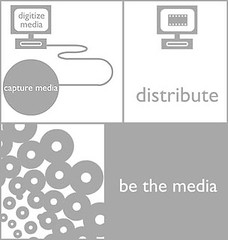 Rene of Luxomedia.com posted the first in a series of "doodles" about "the fine art of moving digital media" the other day. She calls this clip "Be the media" and it's a topic which is central to this blog.
Rene of Luxomedia.com posted the first in a series of "doodles" about "the fine art of moving digital media" the other day. She calls this clip "Be the media" and it's a topic which is central to this blog. "When Strom Thurman ran for president, we voted for him! We're proud of it! And if the rest of the country had followed our lead, we wouldn't have had all of these problems over all of these years either."
"Mike Hall and I are having an argument in the halls here. I believe that podcasting is a term that should only refer to technologies that deliver MP3 files via RSS feeds.
He, on the other hand, believes that podcasting can refer to any file delivered via an RSS feed.
I suggested that we use these terms:
podcasting=MP3 delivered via RSS.
screencasting=screen videos delivered via RSS (format could be Camtasia, WMV, Flash)
videocasting or videoblogging or or vlogging or vblogging=videos delivered via RSS (format could be Quicktime, Windows Media Format, Real, MP4, Flash video, etc).
Do we need other terms?
Oh, and what happens when Steve Jobs releases a video iPod?
What do you think?"
"....if you followed the argument with Mike Hall and me you'll see that I lost the argument and so now I'm calling any kind of audio or video file delivered over RSS a 'podcast.'
Why? Cause podcasting in my mind is 'Personal On Demand Casting' "
 From: Blog Core Values: Blog Comments More Vital Than Posts
From: Blog Core Values: Blog Comments More Vital Than PostsBlog comments are more vital than posts.It's an excellent post, well written and there is much more, but I could not post it all. However. I DISAGREE. I'm posting my response here on my blog, and it should be apparent as you read it why.
Comments make a site interactively dynamic, rather than non-participatorily static.
A blog post just starts the conversation.
Blog posts are a dime a dozen.
It's the unpredictable, uncanny, unnerving response
that steals the show. The star is the comment,
not the post. Post as star is narcissistic.
Without comments, most posts are dead-ends.




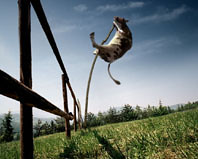 lintrusa-asta.mov
lintrusa-asta.mov i_briganti_mattacchioni.mov
i_briganti_mattacchioni.movThe name is trademarked, and in Italy there is a legal exclusive control exercised over its production and sales by the Parmigiano-Reggiano cheese Consorzio (created by a governmental decree). There are strict criteria each wheel must meet early in the aging process, when the cheese is still soft and creamy, to merit the official seal and be placed in storage for aging. Cheese which fails to meet these criteria is removed and fed to pigs, which are then used to produce prosciutto di Parma.
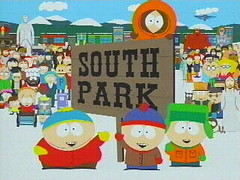 Note to self: Be sure to include South park in the history of viral media. I almost forgot about the Santa Claus vs. Jesus gem. I think it's around somewhere though. Oh, yeah there it is.
Note to self: Be sure to include South park in the history of viral media. I almost forgot about the Santa Claus vs. Jesus gem. I think it's around somewhere though. Oh, yeah there it is.
South Park got its start in 1991 when Parker and Stone, then film students at the University of Colorado, created an animated short called Jesus vs Frosty. The crudely made film featured prototypical versions of the kids of South Park, including a character resembling Cartman but called "Kenny", bringing a murderous snowman to life with a magic hat. The baby Jesus then saves the day by decapitating the monster with a halo.
Executives at the Fox network saw the film, and in 1995 executive Brian Graden commissioned Parker and Stone to create a second short film to send to friends as a video Christmas card. Entitled The Spirit of Christmas, it closely resembled the style of the later series, and featured a martial arts duel (and subsequent truce) between Jesus and Santa Claus over the true meaning of Christmas. The video was a hit and was quickly shared, both by underground duplication and over the then-burgeoning Internet. This led to talks to create a series, first with Fox, then with Comedy Central, where the series premiered on August 13, 1997.
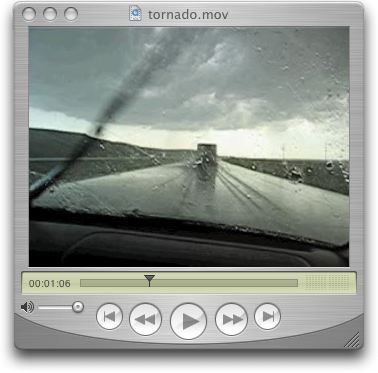 Anyway, I couldn't NOT re-vlog it.
Anyway, I couldn't NOT re-vlog it.